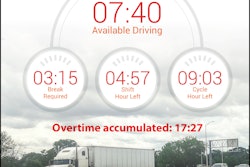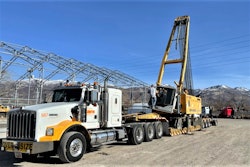A joint op-ed published in CNN Business by Transportation and Labor Secretaries Pete Buttigieg and Marty Walsh in June acknowledged a core issue impacting the availability of capacity in truckload -- not recruiting, but retention. Among large carriers "driver turnover rates for long haul drivers are over 90%," the pair wrote about a dynamic quite familiar to Overdrive readers. For smaller carriers, they asserted, "it’s not much better, 72%. In the long haul sector, drivers are regularly leaving companies or leaving the industry altogether."
There are a myriad reasons for that, but perhaps chiefly competition from other lines of work offering better perceived prospects for individuals, noted Owner-Operator Independent Drivers Association President Todd Spencer. "Trucking realistically hasn’t done much to enhance the occupation of drivers for decades." Today, he feels, carriers are "trying to play catch-up" in that regard as supply chain pressures have increased demand for trucking services without much flex capacity to meet those demands.
Buttigieg and Walsh sounding this alarm from the highest levels of government is no small thing. "Truck drivers, like doctors and nurses, are essential workers and we need to start treating them that way," they wrote. For owner-operator Doug Smith, the pair's message likely signals a willingness to raise the floor for company driver compensation. He advocates for that himself, with the logic that a rising tide lifts all boats.

"Let's remove the exemption from overtime from the Fair Labor Standards Act," Smith said. He's not alone in showing favor for such a move against the exemption, which dates back to the 1930s. It was the third-most-common pick of readers in a poll that asked owner-operators to name what they felt should be the highest priority for the incoming Biden DOT, behind only putting more money into expending parking infrastructure and highways broadly.
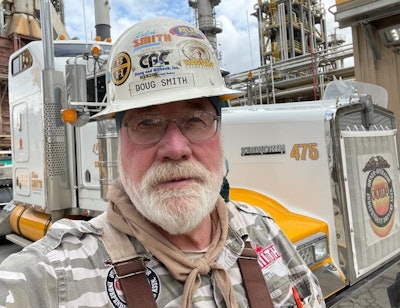 Doug Smith tends to handle his family fleet's more difficult oversize/overweight work after a long career coming up in and then at the helm of the business.
Doug Smith tends to handle his family fleet's more difficult oversize/overweight work after a long career coming up in and then at the helm of the business.
"It doesn’t mater what field," said OOIDA President Spencer. "If you’re always looking for those people you can pay the least, you’ll always be looking for new people."
"I can't believe I'm saying this," Smith himself added, but "the changes that might improve our lives will have to come from the government and not from industry."
Overdrive's conversations with Smith and Spencer followed the first full meeting of the newly convened driver advisory subcommittee, conducted nearly two weeks ago now -- on Thursday, July 29. FMCSA tasked the group with providing input to the full MCSAC on their ongoing work around recruitment and retention issues, particularly in light of supply-chain disruptions experienced since the onset of the pandemic. The discussion revolved around, variously, overlapping issues of compensation, training, infrastructure, enforcement and more. All of them share this common bond: They contribute to truck drivers' premature exits not just from employment at a single carrier, but from trucking entirely.
[Related: Parking, highways, FLSA reform on truckers' DOT wish list]
Overtime for overtime pay?
As the Buttigieg/Walsh op-ed reiterated, the DOT has broadly engaged stakeholders from a variety of different freight transport sectors on supply-chain-disruption issues, as previously reported here, but what in particular is safety regulator FMCSA's interest in the retention issue?
In one sense, there's a clear distinction in the data available on safety performance between experienced and inexperienced drivers, Spencer said. "The agency’s taking an interest in trying to provide an opportunity for intelligent discussion on the broader issue of driver retention and what, if anything, the agency may be able to do in that area." The longer drivers remain active in trucking, the better experienced and safer they get, that line of thinking goes.
Spencer added, "There's been this longstanding assertion that we have a shortage of drivers," and such assertions have rarely let up in the for-hire truckload sector with its high turnover and what amounts to very intense competition for CDL talent. That sort of messaging "now sort of corresponds with the message that’s common through many industries in that finding workers is more challenging now than it’s been" in recent years. "There are a lot of reasons for that."
One is competition from other industries, as intimated above. But many of today's truckers are prioritizing business ownership, too -- in record numbers. In trucking, a new generation of small business owners is finding ways to succeed with good income in spite of growing regulatory and cost pressures. Independent owner-operator Debbie Desiderato, also a subcommittee member, stressed that in her participation in the July meeting.
For an independent, retention doesn't necessarily mean difficulty keeping a driver employee around, of course.
"I think it’s a big problem that we’re all grouped into one big category, because we’re not all just drivers," she said. If regulators want to keep independents around, "you need to lay off a bit. Ever since CSA in 2010, it feels like they've been chipping away at the freedom" inherent in life and business on the road. That's "a big part of what attracts us to the industry."
[Related: Driver shortage claims miss self-employment explosion]
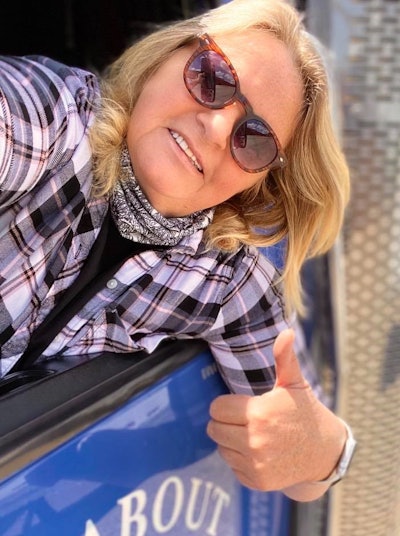 Walkabout Transport independent owner-operator Debbie Desiderato
Walkabout Transport independent owner-operator Debbie Desiderato
Each passing day seems as if it brings a new threat to independent business models, she added. Whether more than doubling liability insurance minimums (currently in the House's INVEST in America Act version of a highway bill) or ABC tests for independent contractor status rolling from California to D.C. and elsewhere.
Independent owner-operators would not benefit directly from the kind of floor-raising overtime-pay move favored by owner-operator Smith, among others. At once, he and so many other owner-operators interviewed by Overdrive in the past feel indirect benefits in rates would no doubt make it all worthwhile.
"It could reduce detention, too," Desiderato said, giving carriers a new cost to pass on to the shippers and receivers. "They need some kind of threat. I could easily incorporate that into my negotiations, figuring in overtime."
There is precedent for the sometimes influential MCSAC committee taking up the subject. In discussion notes from its own July meeting around issues of recruiting and retention, a reference to the 2014 recommendation on the subject is made. Overdrive reported on that series of recommendations, intended to flag priorities for FMCSA advocacy in then-ongoing Congressional highway-bill talks. Committee members then favored repealing the FLSA exemption of transport workers from overtime-pay standards.
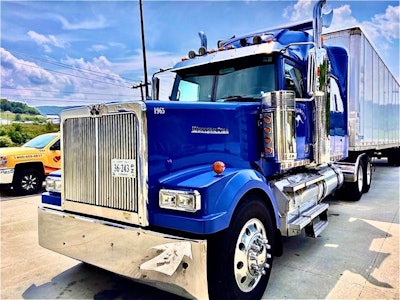 Owner-operator Desiderato's 2017 Western Star 4900EX was also featured in the Overdrive Reader Rigs gallery in recent months.
Owner-operator Desiderato's 2017 Western Star 4900EX was also featured in the Overdrive Reader Rigs gallery in recent months.
The promise of compensated training
At the Salt Lake City-based business that Doug Smith's father founded -- approximately 30-truck Ralph Smith Co. -- compensation of all on-duty not-driving tasks for drivers is the norm, he said. And though overtime schemes might be complicated to implement, given the long dominance of miles- and percentage-pay structures for incentivizing production, guaranteed-salary and hourly structures for company drivers are on the rise all around trucking, as Overdrive's reported in recent months, including among small fleets like Smith's.
They have always been more common than in for-hire truckload operations at private carriers, too, OOIDA's Spencer pointed out.
Smith has passed the reins of the business to his son, Harrison, who's made significant, important moves in another area that saw discussion in the driver subcommittee meeting -- training.
Buttigieg and Walsh emphasized the DOL's "Registered Apprenticeship" training model, which offers employers a structure to provide on-the-job training with compensation that escalates with skills learned. It's the direct opposite of how training occurs through many fleets today, where affiliated schools charge trainees for the opportunity to learn, then undergo a tough adjustment period immediately thereafter in team-training operations.
"I've always said no truck is big enough for two people," Smith said. His company has made headway with a growing cadre of young, newly minted CDL holders who start freshly unlicensed at the company and essentially shadow Harrison. They get not only training on driving tasks but all aspects of the business, Doug said.
"We pay them to learn because they’re out there performing work," he said. Typically the training sees apprentice drivers moving from start outside the cab then into a straight dump to a tractor-trailer, then on to doubles when appropriate. "30 days is the shortest time it's taken" with any such driver, said Smith.
The principal difference between their training and some larger carriers' finishing programs is all in the pre-CDL training. "We don't charge them $4-$5 thousand just to teach them," Smith added.
Ralph Smith Co. then makes a "handshake agreement" that the driver stay on with the company for a year thereafter -- "we've only been burned once or twice," he said. Contrast that, too, with "big-fleet schools who will hand you off to the collection agency to follow you around your whole life" if you don't honor your part of the agreement.
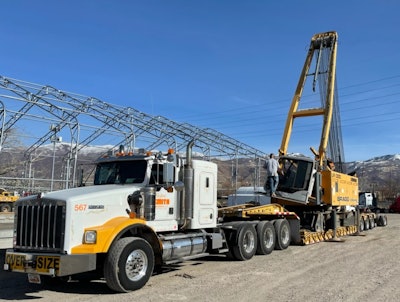 Smith hauls oversize loads in this 2000 Kenworth T800W, spec'd for heavy and oversize. It features a 600 hp Caterpillar C16 under the hood.
Smith hauls oversize loads in this 2000 Kenworth T800W, spec'd for heavy and oversize. It features a 600 hp Caterpillar C16 under the hood.
It's not just such fleets who are to blame for retention problems around trucking, Smith added. He faults some among those who truly love trucking, too. "There’s just enough romance in this business that those of us who love it would do it for free," he said. Over the years, plenty have found "something that’s fun to do and you don’t have to work so hard. That’s part of the problem. While it’s a great feeling of satisfaction in doing something not everybody can do," passing through town on Main Street high in the cab, and "when you get those clean bills handed to you and know that 'I’ve done my part.' ... That feeling of satisfaction has to come along with the financial rewards, too."
[Related: Where are the empty shelves? Keep those rate increases coming, shippers]
Smith's son, Harrison, has taken that message to heart. When Harrison was 12 and riding along with his dad on a grocery load at 2 a.m., "100 miles out and with full tanks and a full moon," Smith said, the young man even then appeared to have priorities straight. He declined to ride out that thrill and instead made the more prudent choice to go to bed.
Doug Smith added, "He’s almost 40 now and he loves this business. He’s got a good personality with the customers, and they’re all doing well."
The full MCSAC committee plans for its fall 2021 meeting to review the Driver Subcommittee notes on these issues and incorporate them into its final retention/recruiting-related report to FMCSA.
Smith noted he was heartened to contribute to the discussion, particularly given the presence of high-ranking agency officials during the 10 a.m. to 3 p.m. meeting.
"It was well-run and well-rounded," Desiderato agreed.
She felt sure that, given the wide variance in opinions among drivers and owners, the full committee was unlikely to "take into consideration everybody’s recommendations – they’ll submit whatever they think will work to the deputy administrator to take it from there."
Further resources:
**The full MCSAC's discussion notes around recruiting/retention issues
**MCSAC's meeting schedule (fall meeting not yet scheduled)
[Related: FLSA reform, parking, detention: MCSAC prioritizes highway reauthorization recommendations]

